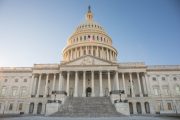
The Washington Post highlighted the contradictory nature of the federal government in two cover stories on June 22. The first story revealed that U.S.-funded subcontractors in the Afghan war are bankrolling the Taliban to the tune of millions of dollars per month and the second story outlined the latest U.S. Supreme Court decision that banned private organizations from giving non-violent advice to terrorist organizations.
The first of those Washington Post stories explained that the “U.S. military is funding a massive protection racket in Afghanistan, indirectly paying tens of millions of dollars to warlords, corrupt public officials and the Taliban to ensure safe passage of its supply convoys throughout the country, according to congressional investigators.” The Post was quoting a congressional report entitled Warlord, Inc., which explained that “outsourcing the supply chain in Afghanistan to contractors has also had significant unintended consequences. The HNT contract fuels warlordism, extortion, and corruption, and it may be a significant source of funding for insurgents.”
The report cites an internal U.S. military memorandum from July 7, 2009, which concluded: “It was highlighted that this authority would enable IDIQ Carriers the flexibility to choose PSC [Private Security Company, i.e., warlord] to perform convoy security. By gaining this authority IDIQ Carriers would stop funding the insurgency of what is estimated at 1.6 – 2 Million Dollars per week.”
And while the United States government is indirectly funding the same Taliban forces that are fighting and killing U.S. soldiers in the Afghan insurgent war, the U.S. Supreme Court handed down a 6-3 decision, Holder v. Humanitarian Law Project, which queued-up humanitarian organizations for criminal prosecution if they provide advice to terrorist organizations that lead to peaceable settlement of disputes. Federal anti-terrorism statutes ban granting “expert advice or assistance” to any organization designated a terrorist organization by the federal government. The non-profit Humanitarian Law Project sued, seeking to give advice on non-violent means of addressing the concerns of the Kurdistan Workers’ Party of Iraq and Turkey and the Tamil Tigers of Sri Lanka and southern India. Both terrorist organizations emerged out of persecuted minority groups, and unlike the Taliban, neither habitually targets Americans.
The majority on the Supreme Court upheld the prohibition, ruling that “the statute is carefully drawn to cover only a narrow category of speech to, under the direction of, or in coordination with foreign groups that the speaker knows to be terrorist organizations.” Imposing on the freedom of speech — despite an explicit prohibition of infringing on free speech in the First Amendment to the U.S. Constitution — is okay with the Supreme Court, the court argued, because it “only incidentally burdens their expression.” The court concluded that “’skilled’ or communications advice derived from ‘specialized knowledge’ — for example, training on the use of international law or advice on petitioning the United Nations — then it is barred.” The court majority sought to narrowly define the First Amendment, arguing that:
The First Amendment issue before us is more refined than either plaintiffs or the Government would have it. It is not whether the Government may prohibit pure political speech, or may prohibit material support in the form of conduct. It is instead whether the Government may prohibit what plaintiffs want to do—provide material support to the PKK and LTTE in the form of speech.
Of course, speech is not material. One cannot see it, weigh it, or pick it up and hold it. It is by definition immaterial. Justice Steven Breyer thoughtfully responded in his dissent:
What is one to say about these arguments — arguments that would deny First Amendment protection to the peaceful teaching of international human rights law on the ground that a little knowledge about “the international legal system” is too dangerous a thing; that an opponent’s subsequent willingness to negotiate might be faked, so let’s not teach him how to try?
The real irony of the front page of the Washington Post for June 22 is that while the United States military continues to provide financing for the same terrorist enemy that is killing American soldiers on an almost daily basis, the Supreme Court has ruled that private citizens cannot provide guidance for terrorist organizations (even organizations which are not threatening Americans) to turn from their paths and find non-violent ways to address their sometimes legitimate gripes in the political realm. The Supreme Court majority ruled that federal officials are entitled to “deference” on this issue, all evidence to the contrary notwithstanding, and despite the clear prohibition on infringement of free speech in the First Amendment.
Photo: AP Images



